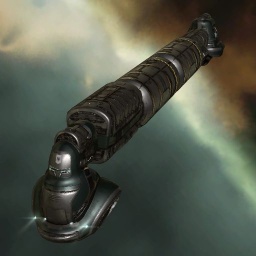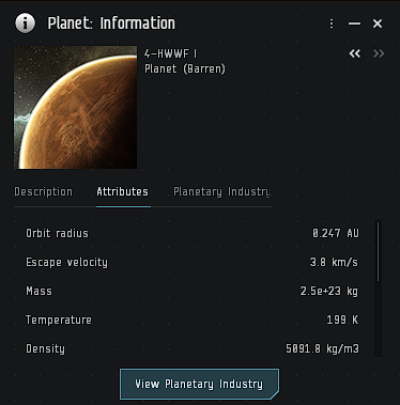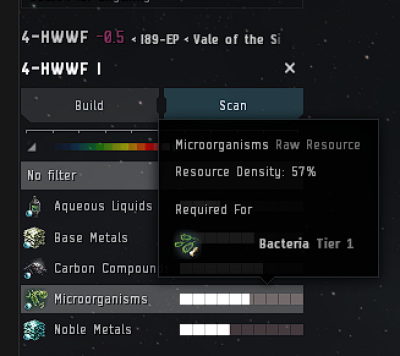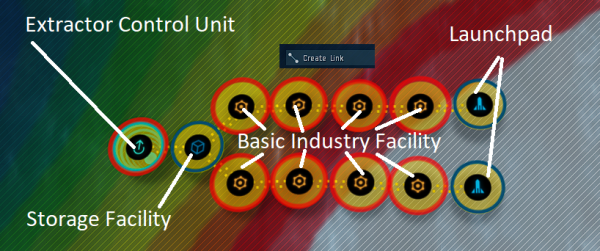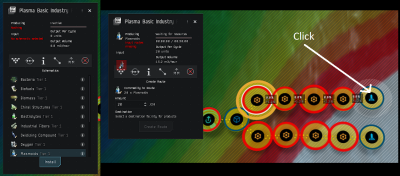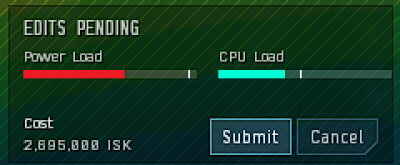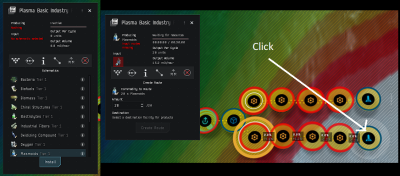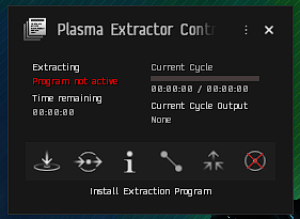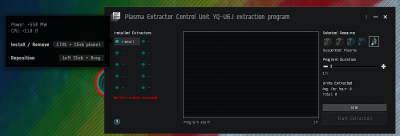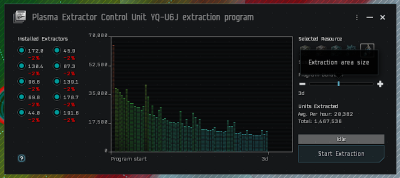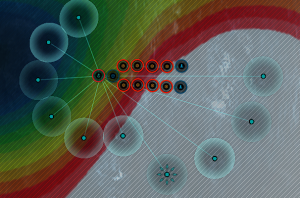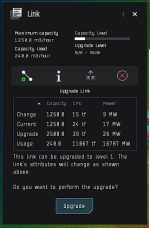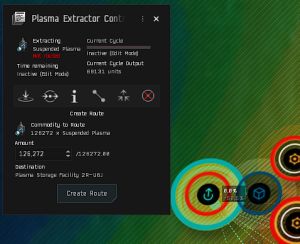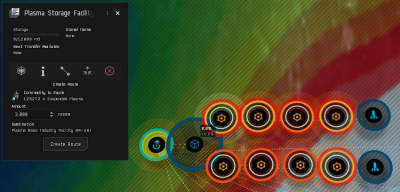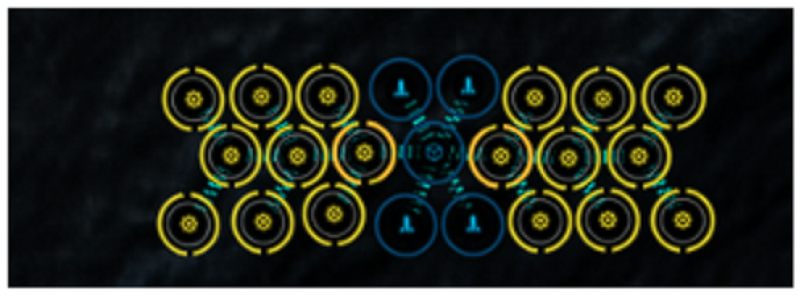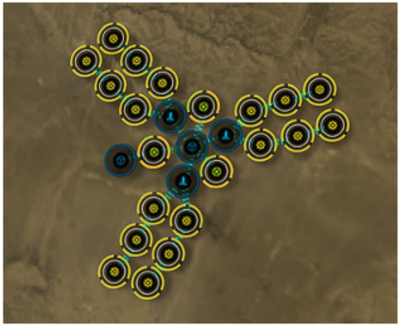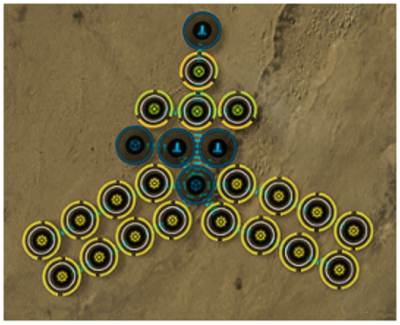HOW-TO: PLANETARY INTERACTION
Planets produce harvestable resources and make up a significant portion of Battleship, Capital and Structure build cost:
- Battleship: 8% PI
- Capital Ships: 20% PI
- Structures: 75% PI
These resources are typically bulky and difficult to move; so harvesting them in Nullsec near our Sotiyo's means we don't need to import from Jita to produce your infrastructure.
This guide will get you setup quickly with Harvesting & Factory planets.
There are also some great external guides, which show this great visually: Hanns PI Charter
FITTING
There is only one type of ship you require for this; the Gallente Hauler "Epithal", which requires Spaceship Command III and Gallente Hauler I. This has a dedicated Command Center bay, which will be used later:
<HTML> [Epithal, Epithal fit]
Inertial Stabilizers II Inertial Stabilizers II Inertial Stabilizers II Inertial Stabilizers II
Medium Hyperspatial Velocity Optimizer I Medium Hyperspatial Velocity Optimizer I Medium Hyperspatial Velocity Optimizer I </HTML>
SKILL PLAN
- Command Center Upgrades 4
- Science 4
- Remote Sensing 4
- Planetology 4
- Interplanetary Consolidation 4 (Provides 1 extra planet per level)
- Advanced Planetology 3
- Command Center Upgrades 5 (Recommended for max-yield, you can reduce the output if you have 4)
HARVEST PLANETS
SCOUTING
Each planet has 5 types of resources:
| Planet | Resource 1 | Resource 2 | Resource 3 | Resource 4 | Resource 5 |
|---|---|---|---|---|---|
| Barren | Aqueous Liquids | Base Metals | Carbon Compounds | Micro Organisms | Noble Metals |
| Gas | Aqueous Liquids | Base Metals | Ionic Solutions | Noble Gas | Reactive Gas |
| Ice | Aqueous Liquids | Heavy Metals | Micro Organisms | Noble Gas | Planktic Colonies |
| Lava | Base Metals | Felsic Magma | Heavy Metals | Non-CS Crystals | Suspended Plasma |
| Oceanic | Aqueous Liquids | Carbon Compounds | Complex Organisms | Micro Organisms | Planktic Colonies |
| Plasma | Base Metals | Heavy Metals | Noble Metals | Non-CS Crystals | Suspended Plasma |
| Storm | Aqueous Liquids | Base Metals | Ionic Solutions | Noble Gas | Suspended Plasma |
| Temperate | Aqueous Liquids | Autotrophs | Carbon Compounds | Complex Organisms | Micro Organisms |
These resources aren't used independently, but can be converted into Basic "P1":
| Resource | Tier 1 Product | Barren | Gas | Ice | Lava | Oceanic | Plasma | Storm | Temperate |
|---|---|---|---|---|---|---|---|---|---|
| Aqueous Liquids | Water | X | X | X | X | X | X | ||
| Autotrophs | Industrial Fibers | X | |||||||
| Base Metals | Reactive Metals | X | X | X | X | X | |||
| Carbon Compounds | Biofuels | X | X | X | |||||
| Complex Organisms | Proteins | X | X | ||||||
| Felsic Magma | Silicon | X | |||||||
| Heavy Metals | Toxic Metals | X | X | X | |||||
| Ionic Solutions | Electrolytes | X | X | ||||||
| Microorganisms | Bacteria | X | X | X | X | ||||
| Noble Gas | Oxygen | X | X | X | |||||
| Noble Metals | Precious Metals | X | X | ||||||
| Non-Cs Crystals | Chiral Structures | X | X | ||||||
| Planktic Colonies | Biomass | X | X | ||||||
| Reactive Gas | Oxidizing Compound | X | |||||||
| Suspended Plasma | Plasmoids | X | X | X |
Planet Types can either be found in-game by choosing "Show Info" on a planet, but can also be found out-of game via Dotlan - Tribute, Vale.
Once you've found the planet type you're after, check the resource density. This tells you how much of that mineral appears on the planet; the higher number the better. Select "Show Info" on a planet, and choose "View Planetary Industry" at the bottom. In the top-left corner, "Build" is selected by default; switch this to "Scan" and it will show the 5 types of resources acquired, and hovering over each individually will show the amount of resources you will get.
After you've found a planet you're interested in, time to set it up!
CAUTION: PI is extremely large. It is advised to set this up in a small range of systems, or in a system in the buyback programme.
SETUP
Grab your Epithal and put the relevent Command Center in its bay. Travel to the target system and tether on a structure. You do not need to be at the Planet to set this up!
Select the planet you're interested in and "Show Info". Then choose "View Planetary Industry". Switch to the "Scan" view and select the resource you're interested in. This will bring up a heat map, where the resources are most abundant.
Switch back to the "Build" tab, and place the Command Center NEAR the abundant resources, and select "Submit".
With the Command Center built, you can now select it and upgrade to as high level as your skills allow.
You will now have more build options available:
| Name | CPU Required | Power Required | Cost | Description |
|---|---|---|---|---|
| Extractor Control Unit | 400 tf | 2600 MW | 45,000.00 ISK | Used to harvest resources |
| Basic Industry Facility | 200 tf | 800 MW | 75,000.00 ISK | Converts resources into P1 |
| Advanced Industry Facility | 500 tf | 700 MW | 250,000.00 ISK | Converts P1 → P2 → P3 |
| High-Tech Industry Facility* | 1100 tf | 400 MW | 525,000.00 ISK | Converts P1+P3 to P4 |
| Storage Facility | 500 tf | 700 MW | 250,000.00 ISK | A buffer between Extractor and Facilities |
| Launchpad | 3600 tf | 700 MW | 900,000.00 ISK | Resources here can be accessed at the Customs Office |
There are a few different ways to visually set this up, but the fundamentals of a harvest planet are:
- Extractor Control Unit needs placing near the resources, and linking to:
- Storage Facility, which needs linking to:
- Basic Industry Facility - place 2 rows of 4 each*, all linked to:
- Launchpad at the end of each route.
*Skills dependent; you may need 2 rows of 3 each
Once these are build and linked, choose "Submit" once more. Note: the Command Center does not need to be linked anywhere!
Next, map the Facilities output. Using the charts above, select the output materials you are after. For example, if you planned to harvest "Noble Metals", select each of your Facilities and choose "Products" → "Precious Metals", and then "Install". This will allow you to route it - send them to the Launchpad at the end of the chain. Hit "Submit" once this step is completed!
The Facilities will now expect a certain input, so move to the Extractor and select "Install Extraction Program". This will open a new window for you to place up to 10 Extractor Heads. Select your resource on the right-hand side, and the amount of time you want them to extract for. Longer Cycles yeild more, but become less effective over time. I set mine for 3 days, but re-cycle them every 2 days.
Place the Extractor Heads where the yeild is highest, and route the entire batch to the Storage Facility. This will act as the buffer. You may need to upgrade the link, if you are pulling too much! Once routed to the Storage Facility, route this outwards to the individual facilities.
Once this is done, hit Submit. Congratulations, your planet is now setup!
MAINTENANCE
Access your planets by going into the Neocom → Industry → Planetary Industry.
Select your planet, select the Extractor Head, stop the extraction, move the heads wherever the resources are most abundant, then restart the extraction.
With 8 Facilities (Level 5), you will have a maximum output of 320 units of P1 per hour, assuming your extractors continuously yield above an average of 48k units per hour.
With 160 (60.8m3) going to each launchpad (10,000m3) per hour, you will need to collect your PI once every 6 days and 20 hours at max yield. With 120 (45.6m3) going to each launchpad (10,000m3) per hour, you will need to collect your PI once every 9 days and 3 hours at max yield.
Once your launchpads are full, travel to their Customs Office with your Epithal and bring them back to a station.
Panda Logistics will buy your PI!
FACTORY PLANETS
P1 -> P2
This can be setup on any planet.
With Level 5 Command Center Upgrades, you can fit 4 Launchpads and 18 Factories producing 90 units of P2 per hour. You will need to take 26,000 Units to each launchpad every 3 days.
With Level 4 Command Center Upgrades, you can fit 4 Launchpads and 12 Factories producing 60 units of P2 per hour. You will need to take 26,000 Units to each launchpad every 4.5 days.
See below the combinations of P1 to make P2, and the 18-Factory Setup.
| P2 | P1 Input A | P1 Input B |
|---|---|---|
| Biocells | Precious Metals | Biofuels |
| Construction Blocks | Toxic Metals | Reactive Metals |
| Consumer Electronics | Chiral Structures | Toxic Metals |
| Coolant | Water | Electrolytes |
| Enriched Uranium | Toxic Metals | Precious Metals |
| Fertilizer | Proteins | Bacteria |
| Genetically Enhanced Livestock | Biomass | Proteins |
| Livestock | Biofuels | Proteins |
| Mechanical Parts | Precious Metals | Reactive Metals |
| Microfiber Shielding | Silicon | Industrial Fibers |
| Miniature Electronics | Silicon | Chiral Structures |
| Nanites | Reactive Metals | Bacteria |
| Oxides | Oxygen | Oxidizing Compound |
| Polyaramids | Industrial Fibers | Oxidizing Compound |
| Polytextiles | Industrial Fibers | Biofuels |
| Rocket Fuel | Electrolytes | Plasmoids |
| Silicate Glass | Silicon | Oxidizing Compound |
| Superconductors | Water | Plasmoids |
| Supertensile Plastics | Biomass | Oxygen |
| Synthetic Oil | Oxygen | Electrolytes |
| Test Cultures | Water | Bacteria |
| Transmitter | Chiral Structures | Plasmoids |
| Viral Agent | Biomass | Bacteria |
| Water-Cooled CPU | Water | Reactive Metals |
P1 -> P3
Coming Soon
P2 -> P4
These can only be built on a Barren or Temperate planet.
P4 has three different templates:
Broadcast Node, Recursive Computing Modules and Self-Harmonizing Power Cores
Created by 3x P3, which require 2x P2 Input. You can produce 3 of these per hour, on a planet you setup with 3x Launchpad, 3x Hi-Tech Constructor, 18x Advanced Facility and 1x Storage Facility.
This requires 3,330 of 6 types of P2, to be maintained every 2d 7h.
Integrity Response Drones and Wetware Mainframes
Created by 3x P3, which require 3x P2 Input. You can produce 3 of these per hour, on a planet you setup with 3x Launchpad, 3x Hi-Tech Constructor, 18x Advanced Facility and 1x Storage Facility.
This requires 2,220 of 9 types of P2, to be maintained every 1d 13h.
Nano-Factory, Organic Mortar Applications and Sterile Conduits
Created by 2x P3 which require 2x P2 input, and 1x P1 Input. You can produce 4 of these per hour, on a planet you setup with 3x Launchpad, 4x Hi-Tech Constructor, 16x Advanced Facility and 1x Storage Facility.
This requires 3,330 of 4 types of P2, to be maintained every 2d 2h. The 3rd Launchpad is specifically for the P1.
| P4 | P3 | P2 | P1 | P4 | P3 | P2 | P1 | P4 | P3 | P2 | P1 | ||
|---|---|---|---|---|---|---|---|---|---|---|---|---|---|
| Broadcast Node | Neocoms | Biocells | Biofuels | Integrity Response Drone | Gel-Matrix Biopaste | Biocells | Biofuels | Nano-Factory | Industrial Explosives | Fertilizer | Proteins | ||
| Precious Metals | Precious Metals | Bacteria | |||||||||||
| Silicate Glass | Oxidizing Compound | Oxides | Oxygen | Polytextiles | Industrial Fibers | ||||||||
| Silicon | Oxidizing Compound | Biofuels | |||||||||||
| Data Chips | Supertensile Plastics | Oxygen | Superconductors | Water | Ukomi Super Conductors | Superconductors | Water | ||||||
| Biomass | Plasmoids | Plasmoids | |||||||||||
| Microfiber Shielding | Industrial Fibers | Hazmat Detection Systems | Polytextiles | Industrial Fibers | Synthetic Oil | Electrolytes | |||||||
| Silicon | Biofuels | Oxygen | |||||||||||
| High-Tech Transmitters | Polyaramids | Oxidizing Compound | Transmitter | Chiral Structures | Reactive Metals | ||||||||
| Industrial Fibers | Plasmoids | Organic Mortar Applications | Condensates | Coolant | Water | ||||||||
| Transmitter | Plasmoids | Viral Agent | Bacteria | Electrolytes | |||||||||
| Chiral Structures | Biomass | Oxides | Oxygen | ||||||||||
| Recursive Computing Module | Guidance Systems | Transmitter | Plasmoids | Planetary Vehicles | Mechanical Parts | Reactive Metals | Oxidizing Compound | ||||||
| Chiral Structures | Precious Metals | Robotics | Consumer Electronics | Toxic Metals | |||||||||
| Water-Cooled CPU | Water | Miniature Electronics | Silicon | Chiral Structures | |||||||||
| Reactive Metals | Chiral Structures | Mechanical Parts | Reactive Metals | ||||||||||
| Synthetic Synapses | Supertensile Plastics | Oxygen | Supertensile Plastics | Oxygen | Precious Metals | ||||||||
| Biomass | Biomass | Bacteria | |||||||||||
| Test Cultures | Water | Wetware Mainframe | Biotech Research Reports | Construction Blocks | Reactive Metals | Sterile Conduits | Smartfab Units | Construction Blocks | Reactive Metals | ||||
| Bacteria | Toxic Metals | Toxic Metals | |||||||||||
| Transcranial Microcontrollers | Biocells | Biofuels | Livestock | Biofuels | Miniature Electronics | Silicon | |||||||
| Precious Metals | Proteins | Chiral Structures | |||||||||||
| Nanites | Reactive Metals | Nanites | Reactive Metals | Vaccines | Livestock | Biofuels | |||||||
| Bacteria | Bacteria | Proteins | |||||||||||
| Self-Harmonizing Power Core | Camera Drones | Rocket Fuel | Electrolytes | Cryoprotectant Solution | Fertilizer | Proteins | Viral Agent | Bacteria | |||||
| Plasmoids | Bacteria | Biomass | |||||||||||
| Silicate Glass | Oxidizing Compound | Synthetic Oil | Electrolytes | Water | |||||||||
| Silicon | Oxygen | ||||||||||||
| Hermetic Membranes | Genetically Enhanced Livestock | Proteins | Test Cultures | Water | |||||||||
| Biomass | Bacteria | ||||||||||||
| Polyaramids | Oxidizing Compound | Supercomputers | Consumer Electronics | Toxic Metals | |||||||||
| Industrial Fibers | Chiral Structures | ||||||||||||
| Nuclear Reactors | Enriched Uranium | Toxic Metals | Coolant | Water | |||||||||
| Precious Metals | Electrolytes | ||||||||||||
| Microfiber Shielding | Industrial Fibers | Water-Cooled CPU | Water |

